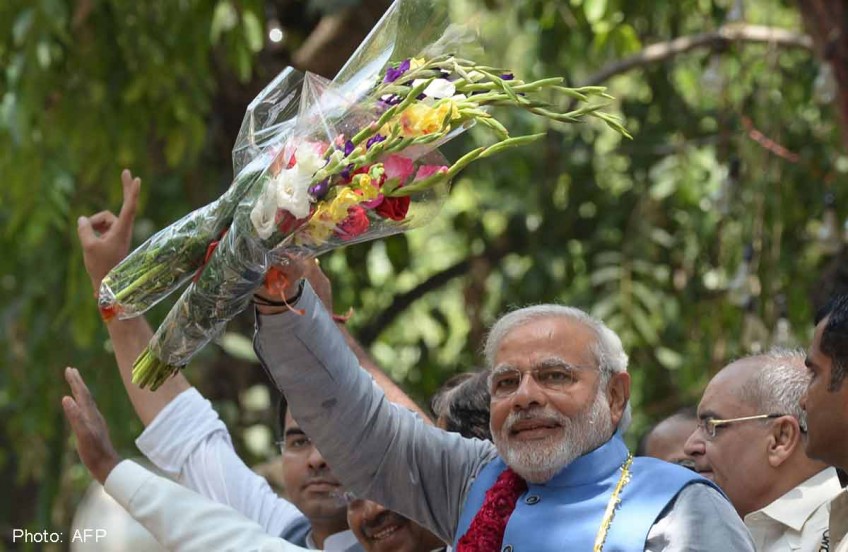India's Hindu hardliners see 'one of their own' as PM

NAGPUR, India - Young men gaze reverently at the flame-shaped memorial to a Hindu supremacist in the grounds of India's biggest grassroots religious organisation, which prime minister-elect Narendra Modi joined as a boy.
In the city of Nagpur, opposite a black-painted statue of the Rashtriya Swayamsevak Sangh (RSS) founder Keshav Hedgewar, the solemn tribute to his successor Madhav Golwalkar is a reminder of what critics say is the group's deep-rooted religious prejudice.
Back in 1938, Golwalkar said India's non-Hindus must adopt Hindu culture, language and religion - "they must cease to be foreigners, or may stay in the country, wholly subordinated to the Hindu nation, claiming nothing, deserving no privileges, far less any preferential treatment".
Across India, thousands of RSS followers campaigned for Modi ahead of his victory last week, which saw his Bharatiya Janata Party (BJP) win the first parliamentary majority in 30 years.
That effort, as well as longstanding ties with the BJP, raises questions about how much the group will influence its most famous alumnus.
"Since a person from RSS is going to be prime minister, we expect he will work not only for the nation, but also for RSS," said Rajeev Varma, a 23-year-old engineering student who campaigned for Modi. "Obviously we feel proud."
But experts say Modi could disappoint the group and its four and a half million members, aware that his prospects depend first and foremost on meeting pledges of growth and development.
"He has to win on the economy, and that's the thing on which he will be judged," Christophe Jaffrelot, a long-time expert on the Hindu nationalism movement, told AFP.
"What if he fails to relaunch the economy? The Hindutva (Hindu nationalist) plank is the plan B," added Jaffrelot, a professor from Sciences Po university in Paris and King's College London.
Cultural champions or pseudo-fascists?
The RSS, whose members wear a uniform of khaki shorts and black hats, describes itself as a cultural outfit devoted to the betterment of the nation and upholding Hindu values.
Critics decry it as a pseudo-fascist organisation that has fuelled religious tensions.
After helping out as a boy, Modi became a full-time volunteer as a young adult - taking the requisite vow of celibacy - for more than 15 years before he joined the BJP.
He recently said the RSS "should be appreciated for their good work". The group is widely described as an ideological parent of the BJP, although volunteers in Nagpur were wary of discussing the elections.
"When the RSS says we are a cultural organisation, it actually is," said Sameer Gautam, 39, who runs a software company - although he joked about "the wall" that comes down on inquiring journalists.
AFP was not allowed to film at the RSS headquarters, a closely-guarded compound in Nagpur, nor at one of the city's daily "shakhas" - a combination of physical training, yoga and religious chanting.
"Their approach is extremely secretive. Most of their communications are verbal," said Kumar Ketkar, a political analyst in Mumbai.
M.G. Vaidya, a prominent 91-year-old RSS activist, said it was difficult to understand the group "because it does not fit into the existing models of social, political or religious institutions".
"One basic value of Hindu culture is appreciation of the plurality of faith. Not only tolerance but appreciation," he told AFP.
Remote control?
Critics such as Rupa Kulkarni Bodhi, a converted Buddhist academic, believe a more sinister agenda is at hand. She says the "dream" of the RSS and BJP is "to convert this nation into a Hindu nation".
At a rare post-election press conference in Nagpur, RSS general secretary Suresh Joshi denied his organisation would be a "remote control" over the new government, although he hinted at an advisory role.
"If they ask us we will suggest (ideas) to them," he told AFP.
The RSS has been banned three times since its inception, including after a former member assassinated Mahatma Gandhi in 1948 and the 1992 demolition of a mosque in Ayodhya which led to nationwide riots.
Members have spoken out against concessions to religious minorities, homosexuality and the special constitutional status of Muslim-majority Kashmir.
They favour a uniform civil code, the protection of cows - sacred to Hindus - and building a temple on the disputed Ayodhya site.
Jaffrelot said Modi would avoid building the temple and provoking tensions, but that he would probably use his power of patronage to pacify hardliners.
Poornima Joshi, who has written extensively on the RSS and BJP, said Modi might prove to be something of a let-down but the group would still welcome his elevation after the secular Congress party's 10-year rule.
"He may disappoint the RSS in some ways but they are a pragmatic bunch," said Joshi. "They've been out in the cold for a long time."